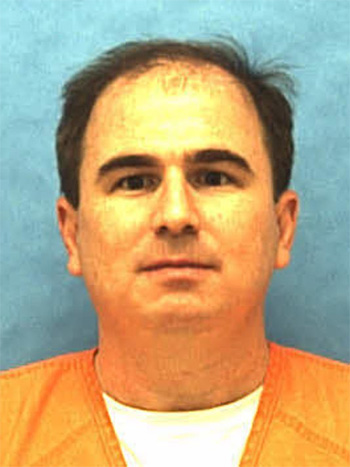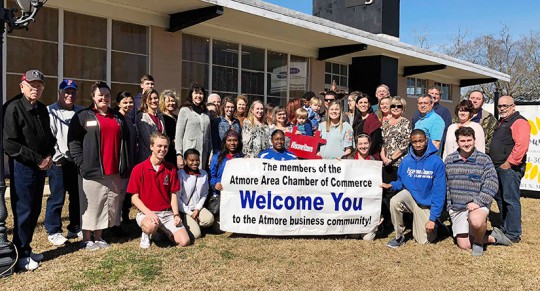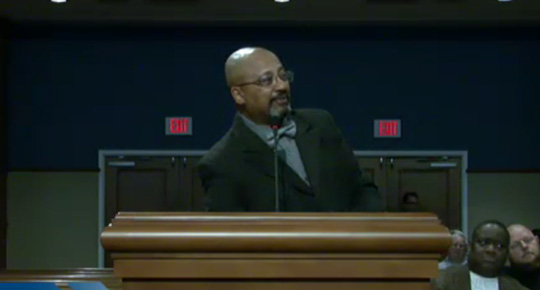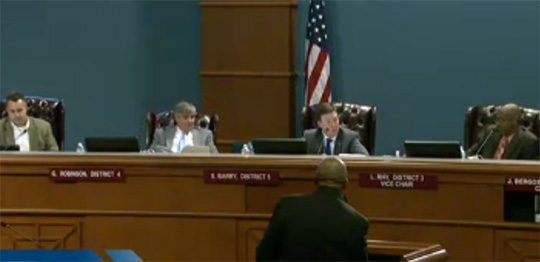A Very Special Mardi Gras Parade (With Photo Gallery)
February 3, 2018
A very special Mardi Gras parade was held Friday morning for the special needs students of Escambia Westgate School.
With plenty of beads, Moon Pies, stuffed animals and smiles, the parade rolled through the school parking lot for students that might not otherwise be able to attend a regular Mardi Gras parade.
Photos courtesy Escambia School District for NorthEscambia.com, click to enlarge.
North Escambia Couple Opens ‘The Yellow Garden’ Floral And Events Store In Atmore
February 3, 2018
North Escambia residents A.J. and Mallorie Beachy held a grand opening celebration and ribbon cutting for their new business The Yellow Garden in Atmore Friday morning.
The store offers a variety of merchandise, including fresh flowers, gift baskets with candles and body scrubs, stuffed bears, balloons, Valentine’s gifts, rentals and much more. Delivery is available.
For more information, call The Yellow Garden at (251) 368-5998. The store is located at 301 North Main Street in Atmore.
NorthEscambia.com photos, click to enlarge.
Florida Gov’t Weekly Roundup: Budgets And A Bombshell
February 3, 2018
With the 2018 legislative session nearing its midpoint, lawmakers are doing their duty.
Dozens of bills are moving through committees, and, maybe most important, the House and Senate have drawn up initial budget plans that tip the scales at more than $87 billion.
But Florida’s political world doesn’t simply focus on the state Capitol during the annual 60-day session, as was apparent this week.
 A Tallahassee federal judge issued a bombshell ruling about restoring the voting rights of felons who have done their time. Meanwhile, more than 400 miles to the south, Republican Congressman Ron DeSantis held a coming-out party for his gubernatorial campaign.
A Tallahassee federal judge issued a bombshell ruling about restoring the voting rights of felons who have done their time. Meanwhile, more than 400 miles to the south, Republican Congressman Ron DeSantis held a coming-out party for his gubernatorial campaign.
CLOSE, BUT YET SO FAR
First, the good news about the initial budget proposals that key House and Senate committees approved this week: The total amounts of the proposals are only about $100 million apart, a difference that really isn’t a big deal in the context of divvying up more than $87 billion.
“I think we’re in great shape,” Senate Appropriations Chairman Rob Bradley, R-Fleming Island, said Wednesday after his committee unanimously passed the $87.3 billion Senate budget bill (SB 2500). “The overall numbers are very similar.”
But in the budget world, big numbers can be somewhat deceiving. That’s because the House and Senate will still have to agree on all of the details about how money should be spent.
In the coming weeks, House and Senate leaders will have to work out differences in several policy areas.
For example, the Senate wants to spend more money than the House on higher education, a top priority of Senate President Joe Negron, R-Stuart. Meanwhile, the House, which has an overall $87.2 billion budget proposal, wants to set aside more money for school-choice programs, a priority of House Speaker Richard Corcoran, R-Land O’ Lakes.
Also, the two chambers differ on health-care issues such as how the state pays hospitals to care for Medicaid patients.
The proposed budgets will go to the full House and Senate during the coming week and likely will be tweaked. That will set the stage for negotiations to try to agree on a final spending plan before the scheduled March 9 end of the legislative session.
NO MORE KOWTOWING?
Restoration of voting rights for ex-felons has long been a controversial issue in Florida. But a federal judge, in no uncertain times, ruled this week that Florida’s system of deciding whether rights should be restored is arbitrary and unconstitutional.
“Florida strips the right to vote from every man and woman who commits a felony,” U.S. District Judge Mark Walker wrote in a 43-page ruling Thursday. “To vote again, disenfranchised citizens must kowtow before a panel of high-level government officials over which Florida’s governor has absolute veto authority. No standards guide the panel. Its members alone must be satisfied that these citizens deserve restoration. Until that moment (if it ever comes), these citizens cannot legally vote for presidents, governors, senators, representatives, mayors, or school-board members.”
Gov. Rick Scott, Attorney General Pam Bondi, Agriculture Commissioner Adam Putnam and state Chief Financial Officer Jimmy Patronis serve as the state’s clemency board, which determines whether rights should be restored. Under the system, ex-felons must wait five or seven years after finishing their sentences — including probation, parole and fines — before they can apply to have their rights restored, according to Walker’s ruling.
But applying doesn’t mean that Scott and the Cabinet members will agree to restore the felons’ rights. In his ruling, Walker focused heavily on what he saw as the arbitrariness of the system, which he ruled violated First Amendment rights and equal-protection rights under the U.S. Constitution’s 14th Amendment.
The voting-rights group Fair Elections Legal Network filed the lawsuit last year. Walker did not decide how the rights-restoration process should change and gave the plaintiffs and the state until Feb. 12 to file briefs on the issue.
But Scott’s office issued a statement late Thursday indicating it doesn’t plan to back down.
“The discretion of the clemency board over the restoration of felons’ rights in Florida has been in place for decades and overseen by multiple governors,” John Tupps, a Scott spokesman, said in the statement. “The process is outlined in Florida’s Constitution, and today’s ruling departs from precedent set by the United States Supreme Court.
“The governor believes that convicted felons should show that they can lead a life free of crime and be accountable to their victims and our communities. While we are reviewing today’s ruling, we will continue to defend this process in the court.”
Regardless of Walker’s ruling, voters will decide in November whether to approve a proposed constitutional amendment on the restoration issue.
The proposal, backed by a political committee known as Floridians for a Fair Democracy, seeks to automatically restore the voting rights of most felons who have served their sentences, completed parole or probation and paid restitution. Automatic restoration would not apply to murderers and sex offenders.
DESANTIS DIVES IN
As the 2018 elections draw closer, one of the most-watched issues will be how candidates are affected by their ties to President Donald Trump.
But as DeSantis formally launched his gubernatorial campaign this week during an event in Boca Raton, he touted his relationship with Trump.
“I want to thank the president for his support,” DeSantis said. “As we’ve seen in the aftermath of this tax bill, the president and his supporters in Congress, we’re keeping our word in getting the American economy moving again.”
That type of message could help with the Republican base, as DeSantis squares off with Putnam and probably Corcoran for the GOP nomination. But the Trump ties could be trickier in a general-election campaign.
Democrats quickly moved to make an issue of DeSantis’ relationship with Trump, who continues to suffer from low overall poll numbers.
“Congressman Ron DeSantis (R-Fox News) officially rolled out his campaign for governor with a speech that was ’light on policy’ but heavy on love for Donald Trump,” the Florida Democratic Party said in an email.
During his campaign kickoff, however, DeSantis also hit on some time-tested themes for Republicans, who have dominated state government for the past two decades.
“I’m proud to stand here today before you, as a veteran of our Armed Forces, as a principled conservative leader and with the support of our president, to be running for governor of Florida — the greatest state in the union,” DeSantis said. “A governor needs to lead, and I pledge that I will work every day to secure Florida’s future by expanding economic opportunities, promoting innovation and education and keeping our streets and communities safe.”
STORY OF THE WEEK: U.S. District Judge Mark Walker ruled that the state’s system for restoring rights of ex-felons is unconstitutional.
QUOTE OF THE WEEK: “Here, plaintiffs’ protected expressive and associational activities are at risk of viewpoint discrimination because the (clemency) board may defer restoration of rights for years — or forever. Defendants (the state) cannot — whether arbitrarily or motivated by political, racial, or religious bias — kick the can down the road for so long that they violate former felons’ rights to free association and free expression without offending the Constitution.” — U.S. District Judge Mark Walker, in his Thursday ruling on restoration of rights.
by Dara Kam, The News Service of Florida
An Early Spring! North Escambia Weather Ducks Miss Shadow
February 2, 2018
On this Groundhog Day, Punxsutawney Phil, the world famous groundhog, saw his shadow and predicted six more weeks of winter. But our local weather guys, the NorthEscambia.com Weather Ducks, missed their shadow on an overcast Friday morning and predicted an early spring for the North Escambia area that’s seen two Florida snow and ice storms so far this winter season.
Forklore says that if the groundhog sees his shadow on Groundhog Day, it means six more weeks of winter. We did not have a groundhog handy for a photo, but we did have the NorthEscambia.com Weather Ducks (pictured above).
And unlike like their more famous Pennsylvania weather buddy, our weather ducks also did not see their shadow Friday morning here in North Escambia.
NorthEscambia.com photos, click to enlarge.
Escambia Commission Gives Support To Navy Federal Nine Mile Road Flyover Project
February 2, 2018
The Escambia County Commission gave support Thursday night to a plan to alleviate traffic problems in the area of the Navy Federal Campus on Nine Mile Road. The move came after Navy Federal warned commissioners they may reconsider their growth plans in Escambia County without action to improve the traffic situation.
The commission voted 4-1, Commissioner Jeff Bergosh dissenting, to join Navy Federal and the Florida Department of Transportation in recommending a plan that includes an overpass on Nine Mile Road. This would allow Navy Federal employees to exit the campus on a new Navy Federal Way using two turn lanes to head east, while allowing Nine Mile Road traffic to flow both directions on the overpass above.
Eliminating the traffic signal will improve travel time along Nine Mile Road, according to transportation officials. It is estimated the plan will cost $68 million and take 4-6 years to complete if and when it is approved.
The plan will no go to the Florida-Alabama Transportation Planning Organization (TPO) at its February 14, 2018 meeting for further support and possible inclusion into the FL-AL TPO Long Range Transportation Plan.
A Navy Federal officer warned commissioners that the company reconsider growth plans in Escambia County unless traffic problems are solved soon.
Kara Cardona, vice president of Greater Pensacola Operations for Navy Federal, read a prepared statement, saying, “”We love Pensacola and we appreciate the great support we receive from this community, which is a big part of why we have decided to expand from 3,000 to 10,000. However, if the traffic flow problem is not addressed quickly, we really do not want to be in a position where we have to reevaluate our growth in this community.”
Current employment at the site is over 6,000 and will climb to 10,000 by 2026 at the very latest, but Cardona said they expect the employment level to by reached sooner. Cardona says it is common for employees to waste 30 minutes getting out of the parking lot at shift change.
The discussion and public input in the plan lasted for over two hours Thursday night. Bergosh told commissioners that he wanted more time to hold a town hall and get input from his constituents.
The county’s vote of support for the plan will not negatively impact or replace the County’s support for the Beulah Interchange and Beltway Project.
Pictured: The Nine Mile Road Flyover at Navy Federal Way proposal supported by Escambia County, Navy Federal and the Florida Department of Transportation. NorthEscambia.com image, click to enlarge.
Century’s Mayor Takes On Public Transit Before County Commission In ‘Bold’ Move
February 2, 2018
Century Mayor Henry Hawkins went before the Escambia County Commission Thursday night to plead to keep an Escambia County Area Transit (ECAT) bus to his town. And instead of the bus being cut, he may have walked away close to having his own $400,000 commuter transit system after what was termed a “bold” move.
In an article published Thursday morning on NorthEscambia.com, Commissioner Doug Underhill took aim at eight low performing ECAT routes he wants to see cut. Instead, he said wants to see an estimated $4 million of gas tax money funneled toward bridge maintenance.
Hawkins approached the commission after learning of the idea that could cut his town’s only bus route to the rest of the county.
“We have a lot of folks that ride the bus that is there only source of transportation, so please don’t kill that route,” he said.
“You actually don’t have a lot of folks that ride that bus. It’s actual a very low usage route,” Underhill said. “That bus route costs almost $400,000 per year, and that is gas tax money that could be used for transportation based infrastructure. Would it not be beneficial to the city of Century to have $400,000 per year in transportation based infrastructure instead of that bus route.?”
“You gonna give us $400,000, we’ll create our own bus route,” Hawkins quipped, drawing a little laughter from the audience.
“Each of these routes costs an enormous amount of money,” Underhill said. “What I am looking at is this money could be re-purposed for infrastructure associated with transportation.”
Hawkins said with just three buses stopping per day — morning, midday and late afternoon — the service is not frequent enough.
But Underhill said data would not support more riders with more frequent routes — “that defies logic”, he replied.
“They are paying $20 for somebody (an individual, not the bus) to take them to Pensacola and back,” he said. “If we could have buses that were more consistent during the day, then yeah you would have more riders.”
Hawkins said with $80,000 and four mini-buses, Century could enter into an interlocal agreement with ECAT and connect with an ECAT route in Cantonment every hour and a half. He said that would fill the buses.
“That’s an interesting idea,” Underhill stated. “At this point, anything other than what we are doing is certainly on the table. That’s a pretty profound statement. I like the fact that you did it as bold as you did.” He questioned whether the $400,000 cost of the ECAT route to Century is having $400,000 worth of impact.
“If you come to Century on any given day, you’ll find people walking, pushing strollers, toting babies getting to and from the clinic. That’s every day.”
“If something like that would serve your people better,” Underhill said, referring to the citizens of Century, “I would certainly be wide open to it … that’s a pretty cool thing you are taking about. I would like to hear more about that idea.”
Commissioner Steven Barry said he would support exploring the idea. He also pointed out the current ECAT route north serves not only Century but other stops along the way such as Cantonment and Molino.
Commissioner Lumon May stated he is not interested in eliminating any public transportation in Century or cutting routes, but he said he would be supportive of better spending with increased ridership.
Mike Crittenden, who directs mass transit for Escambia County, said the Century route is partially funded by a grant, and the county is looking at smaller vehicles for additional local commuter runs in the area.
The commission took no action on ECAT or mass transit Thursday night, instead rescheduling discussions for their next meeting on February 15.
Pictured: Century Mayor Henry Hawkins addresses the Escambia County Commission Thursday night in Pensacola. Images for NorthEscambia.com, click to enlarge.
Four-Year Old Critical After Being Ejected From Vehicle
February 2, 2018
A four-year is in critical condition after being thrown from a vehicle during a three vehicle crash Thursday moring.
According to the Florida Highway Patrol (FHP), 69-year-old Sara Hyduk was heading northbound on Davis Highway just after 8:45 a.m. Two other vehicles, driven by Antonio Cuffy and Sabrina Condino, were stopped at a red light on Davis Highway near Johnson Avenue.
The FHP said Hyduk may have had a medical emergency and lost consciousness, causing her to lose control of the vehicle and collide with the vehicles driven by Cuffy and Condino. An unrestrained four-year old boy in Cuffy’s Hyundai Santa Fe was ejected from the vehicle and thrown under the Buick Park Avenue driven by Hyduk.
Cuffy and Condino were not injured.
Any charges in the crash are pending the outcome of a Florida Highway Patrol investigation.
Tougher Texting While Driving Ban Heads To House Floor
February 2, 2018
A bill that would let police pull over motorists for texting while driving cruised through the House Government Accountability Committee on Thursday and is now ready to go to the House floor.
The proposal (HB 33), filed by Rep. Emily Slosberg, D-Boca Raton, and Rep. Jackie Toledo, R-Tampa, would make texting while driving a “primary” offense.
Under current law, it is a “secondary” offense, with motorists only cited if they are pulled over for other infractions such as running a red light or speeding.
The House committee, which unanimously approved the bill, added an amendment to require law-enforcement officers to separately record the race and ethnicity of people ticketed for texting while driving. That matches a requirement in the Senate version of the bill (SB 90).
“We just want to keep a record of what’s transpiring out there,” said Rep. Barbara Watson, a Miami Gardens Democrat who sponsored the amendment. When the reporting requirement was added last week to the Senate bill, Sen. Perry Thurston, D-Fort Lauderdale, said the data collection would help determine if minorities are disproportionately ticketed for texting while driving.
The bills would allow motorists to make phone calls on electronic devices while driving. Also, the devices could be used for such things as getting directions.
The Senate proposal, sponsored by Gainesville Republican Keith Perry, has cleared three panels and awaits an appearance before the Appropriations Committee.
by The News Service of Florida
Area Under A Severe Drought, But Weekend Rain Relief Forecast
February 2, 2018
A severe drought now exists across the area, according to the latest information released Thursday by the U.S. Drought Monitor. But there’s a possibility of some relief this weekend and into next week. Rain chances will increase on Saturday to 80 percent by Saturday night, with rain continuing into Sunday. And there’s another chance of rain by Tuesday and Wednesday.
Killer Of UWF Student Seeks Stay Of Execution
February 2, 2018
Scheduled to die by lethal injection on February 22, Death Row inmate Eric Scott Branch is asking the Florida Supreme Court for a stay of execution while he appeals a high-profile legal issue to the U.S. Supreme Court.
 Branch was sentenced to death in the 1993 sexual assault and murder of University of West Florida student Susan Morris. Gov. Rick Scott last month scheduled Branch’s execution for February 22.
Branch was sentenced to death in the 1993 sexual assault and murder of University of West Florida student Susan Morris. Gov. Rick Scott last month scheduled Branch’s execution for February 22.
But in the motion for a stay, Branch’s attorneys wrote that he will base his appeal on arguments related to a 2016 U.S. Supreme Court ruling in a case known as Hurst v. Florida. The U.S. Supreme Court ruling found Florida’s death-penalty sentencing system was unconstitutional because it gave too much authority to judges, instead of juries. A subsequent Florida Supreme Court ruling said juries must unanimously agree on critical findings before judges can impose death sentences and must unanimously recommend the death penalty.
But the Florida Supreme Court made the new sentencing requirements apply to cases since June 2002. That is when the U.S. Supreme Court issued a ruling known as Ring v. Arizona that was a premise for striking down Florida’s death-penalty sentencing system in 2016.
Branch and dozens of other Death Row inmates who were sentenced to death before the Ring decision argued that the new unanimity requirements should also apply retroactively to their cases. The Florida Supreme Court has rejected those arguments.
In the motion for a stay, Branch’s attorneys wrote that the U.S. Supreme Court “will be inundated in the coming months” with challenges to the Florida Supreme Court’s refusal to apply the new sentencing requirements to inmates such as Branch.
 “A stay of execution by this (Florida Supreme) Court here may also avoid needless last-minute stay litigation in this and other cases in the United States Supreme Court and is consistent with the widely-accepted judicial policy that lower courts enter stays of their decisions pending review by a higher court,” the brief said.
“A stay of execution by this (Florida Supreme) Court here may also avoid needless last-minute stay litigation in this and other cases in the United States Supreme Court and is consistent with the widely-accepted judicial policy that lower courts enter stays of their decisions pending review by a higher court,” the brief said.
Attorney General Pam Bondi’s office, however, filed a response Thursday asking the Florida Supreme Court to reject the stay.
by The News Service of Florida


















